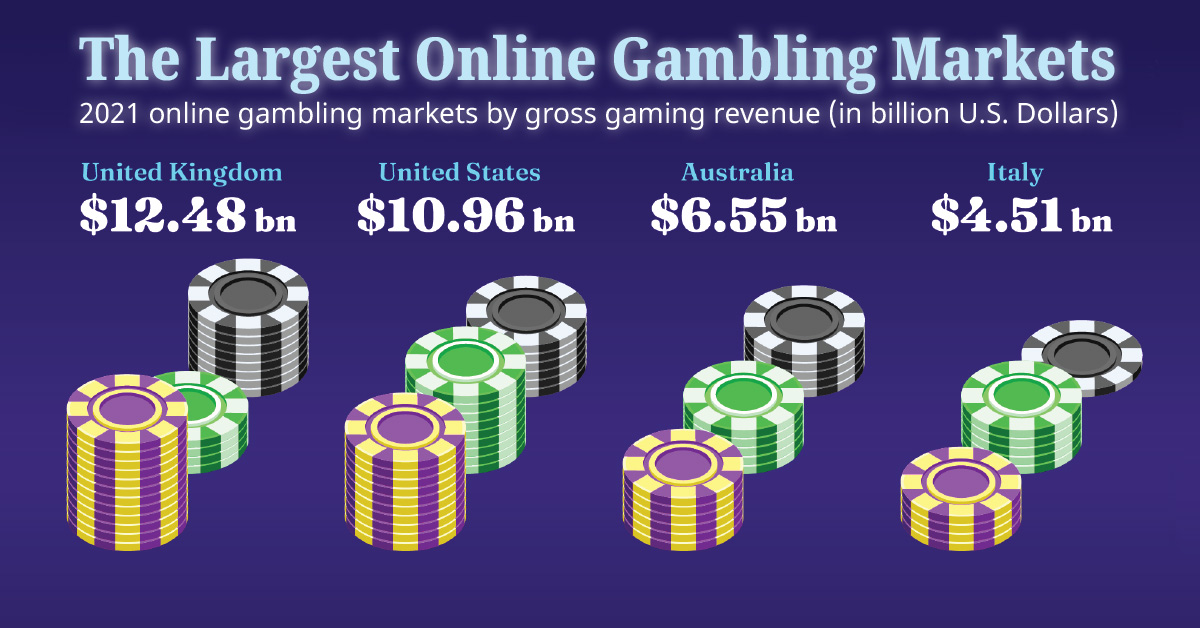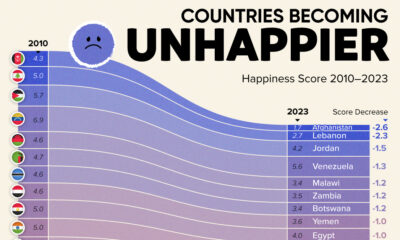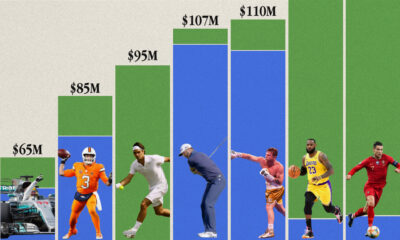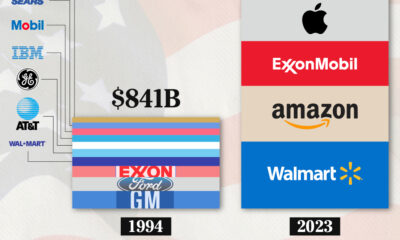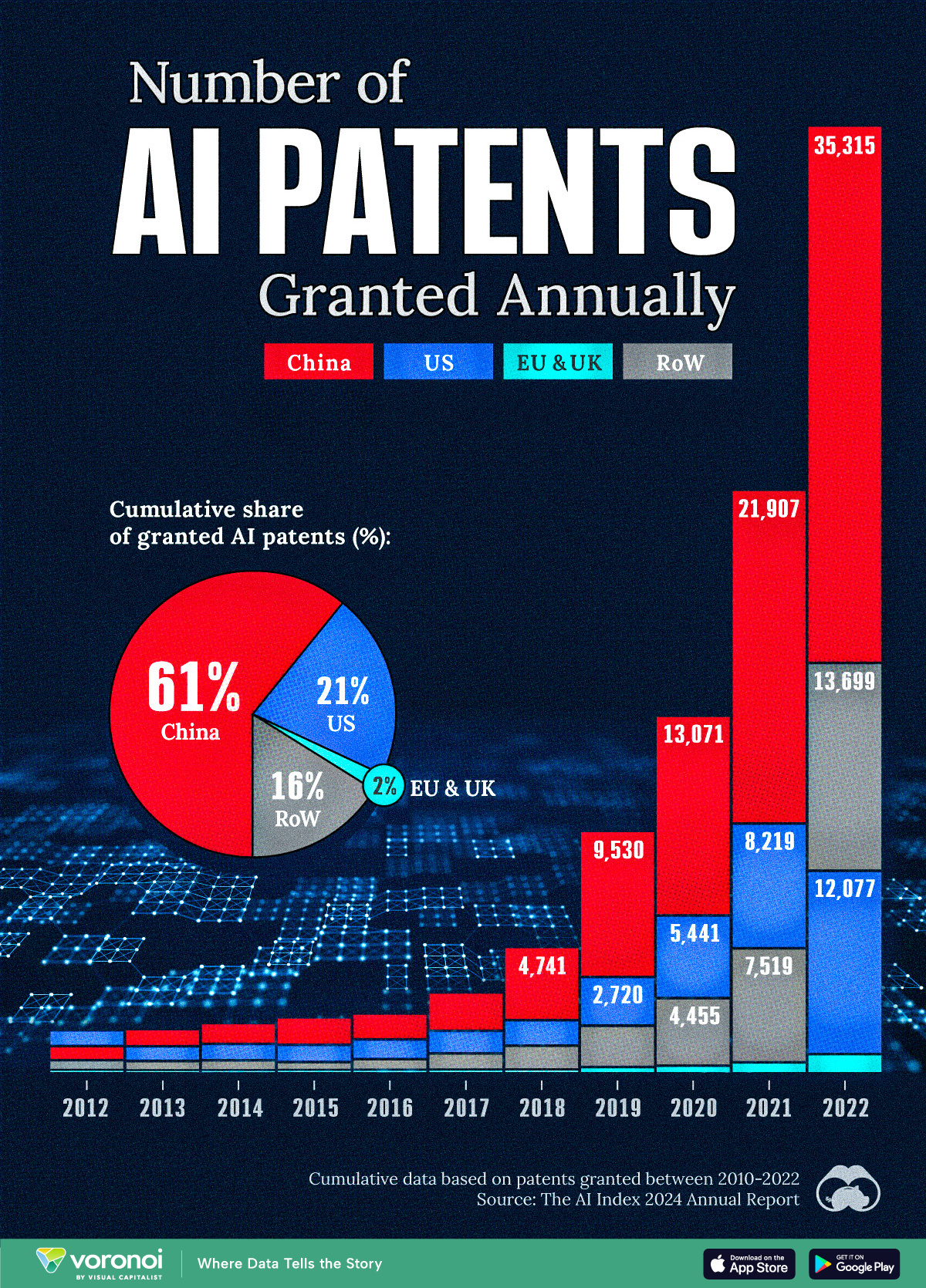Technology
Visualized: The Largest Online Gambling Markets
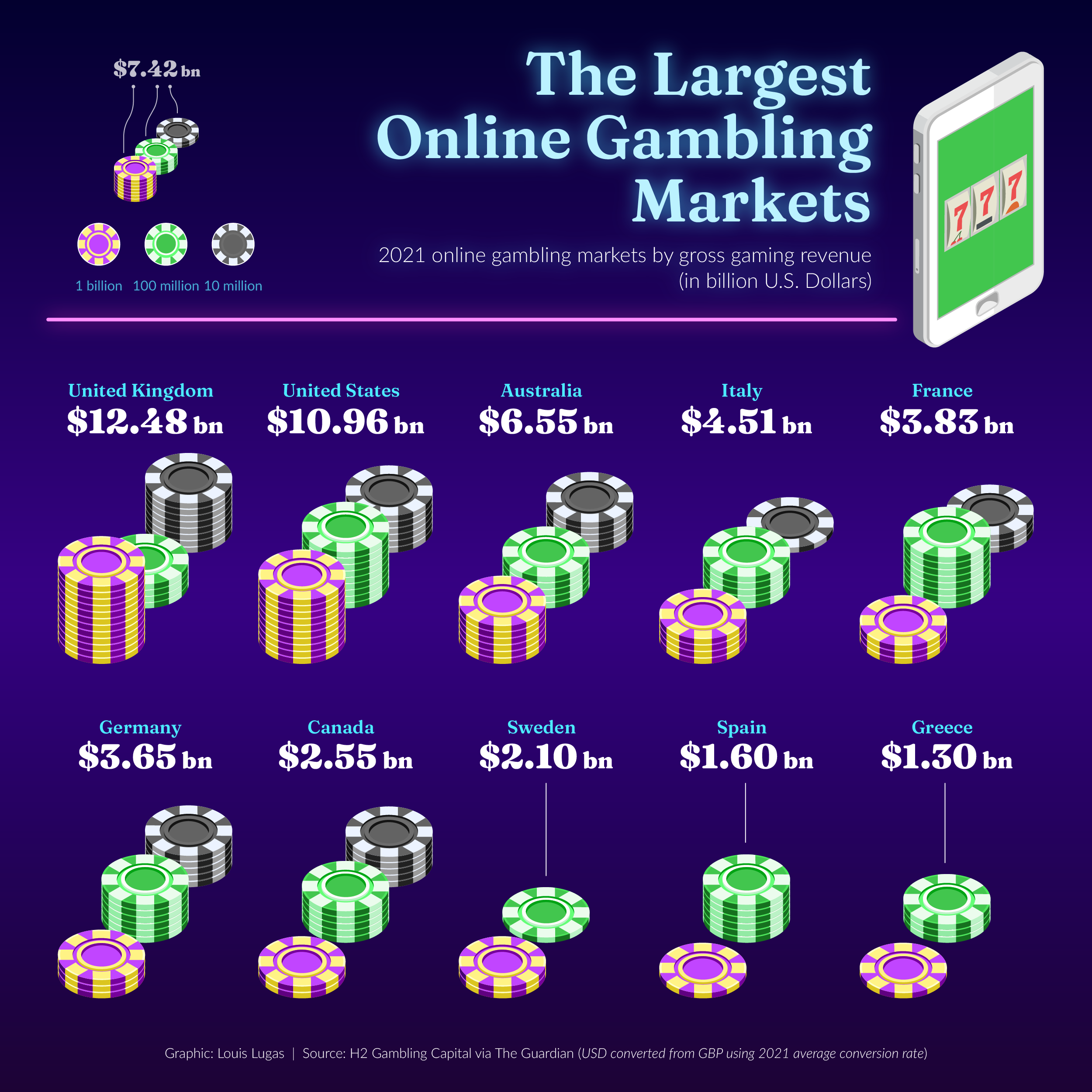
Visualized: The Largest Online Gambling Markets
Gone are the days when gambling enthusiasts had to travel to the nearest casino or find underground gambling dens for a few games of poker or blackjack.
The start of internet gambling or virtual gambling provided enthusiasts with an avenue to spend their time (and money) at the click of a button from anywhere in the world.
Today, these digital casinos have turned into a multibillion-dollar industry in some countries. This graphic by Louis Lugas Wicaksono uses data from the H2 Gambling Capital—as cited by The Guardian—to highlight the countries with the largest regulated online gambling markets.
Biggest Online Gambling Markets in 2021
Gross online gaming revenue globally was estimated to have reached a whopping $102 billion in 2021. Here are the largest markets on a per-country basis.
| Rank | Country | Online Gambling Revenue (USD, 2021) |
|---|---|---|
| 1 | 🇬🇧 United Kingdom | $12.48 billion |
| 2 | 🇺🇸 United States | $10.96 billion |
| 3 | 🇦🇺 Australia | $6.55 billion |
| 4 | 🇮🇹 Italy | $4.51 billion |
| 5 | 🇫🇷 France | $3.83 billion |
| 6 | 🇩🇪 Germany | $3.65 billion |
| 7 | 🇨🇦 Canada | $2.55 billion |
| 8 | 🇸🇪 Sweden | $2.10 billion |
| 9 | 🇪🇸 Spain | $1.60 billion |
| 10 | 🇬🇷 Greece | $1.30 billion |
Far and away at the top of the rankings, the UK ($12.5B) narrowly surpasses the U.S. ($11B) as the largest online gambling market in the world.
Next up is Australia ($6.5B) in third, comparatively with roughly half of the UK’s gaming spend. Europe features prominently on the top 10 list, including Italy, France, Germany, Sweden, Spain, and Greece.
Notably, no countries from Asia, South America, or Africa feature in the top 10. That’s despite some Asian countries having higher economic outputs and GDP per capita metrics than some of the featured European countries.
The True Cost of Gambling Revenue
Online gambling markets rose to new heights of popularity during the COVID-19 pandemic, as people were pushed into isolation with only time and the internet for company. In turn, this raised concerns of gambling addiction and its impacts, including crime.
England alone saw close to 3,000 cases of theft, fraud, and other gambling-related crimes between 2019 and 2020. Governments have now started pushing for policy changes to control these issues before it is too late.

This article was published as a part of Visual Capitalist's Creator Program, which features data-driven visuals from some of our favorite Creators around the world.
Technology
Visualizing AI Patents by Country
See which countries have been granted the most AI patents each year, from 2012 to 2022.
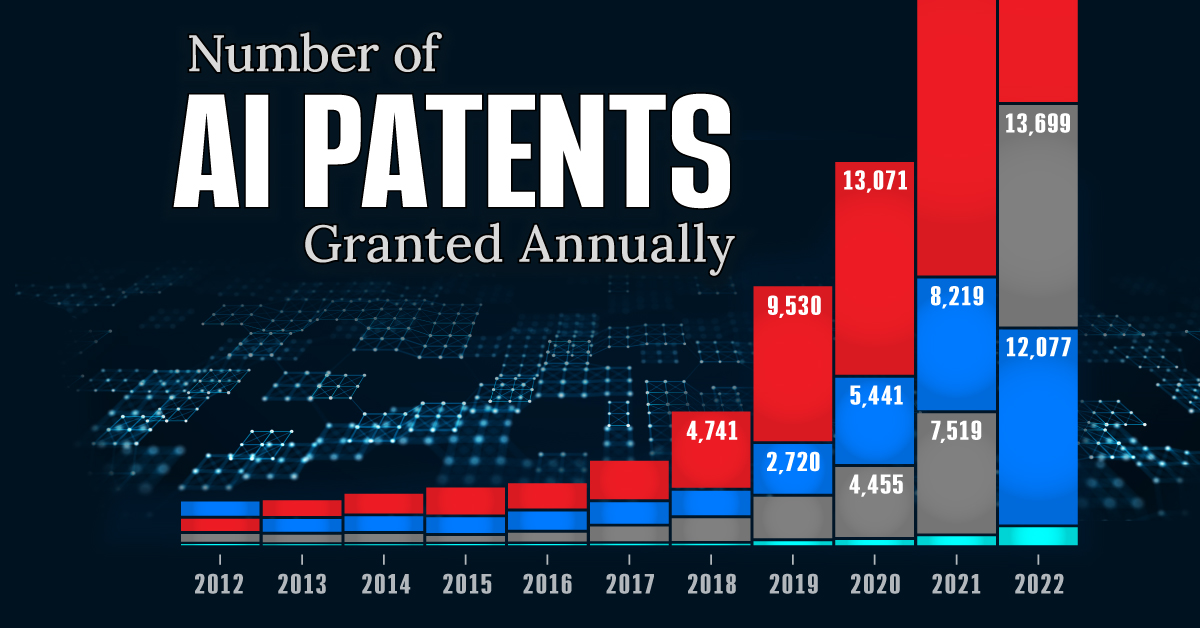
Visualizing AI Patents by Country
This was originally posted on our Voronoi app. Download the app for free on iOS or Android and discover incredible data-driven charts from a variety of trusted sources.
This infographic shows the number of AI-related patents granted each year from 2010 to 2022 (latest data available). These figures come from the Center for Security and Emerging Technology (CSET), accessed via Stanford University’s 2024 AI Index Report.
From this data, we can see that China first overtook the U.S. in 2013. Since then, the country has seen enormous growth in the number of AI patents granted each year.
| Year | China | EU and UK | U.S. | RoW | Global Total |
|---|---|---|---|---|---|
| 2010 | 307 | 137 | 984 | 571 | 1,999 |
| 2011 | 516 | 129 | 980 | 581 | 2,206 |
| 2012 | 926 | 112 | 950 | 660 | 2,648 |
| 2013 | 1,035 | 91 | 970 | 627 | 2,723 |
| 2014 | 1,278 | 97 | 1,078 | 667 | 3,120 |
| 2015 | 1,721 | 110 | 1,135 | 539 | 3,505 |
| 2016 | 1,621 | 128 | 1,298 | 714 | 3,761 |
| 2017 | 2,428 | 144 | 1,489 | 1,075 | 5,136 |
| 2018 | 4,741 | 155 | 1,674 | 1,574 | 8,144 |
| 2019 | 9,530 | 322 | 3,211 | 2,720 | 15,783 |
| 2020 | 13,071 | 406 | 5,441 | 4,455 | 23,373 |
| 2021 | 21,907 | 623 | 8,219 | 7,519 | 38,268 |
| 2022 | 35,315 | 1,173 | 12,077 | 13,699 | 62,264 |
In 2022, China was granted more patents than every other country combined.
While this suggests that the country is very active in researching the field of artificial intelligence, it doesn’t necessarily mean that China is the farthest in terms of capability.
Key Facts About AI Patents
According to CSET, AI patents relate to mathematical relationships and algorithms, which are considered abstract ideas under patent law. They can also have different meaning, depending on where they are filed.
In the U.S., AI patenting is concentrated amongst large companies including IBM, Microsoft, and Google. On the other hand, AI patenting in China is more distributed across government organizations, universities, and tech firms (e.g. Tencent).
In terms of focus area, China’s patents are typically related to computer vision, a field of AI that enables computers and systems to interpret visual data and inputs. Meanwhile America’s efforts are more evenly distributed across research fields.
Learn More About AI From Visual Capitalist
If you want to see more data visualizations on artificial intelligence, check out this graphic that shows which job departments will be impacted by AI the most.
-

 Markets1 week ago
Markets1 week agoU.S. Debt Interest Payments Reach $1 Trillion
-

 Business2 weeks ago
Business2 weeks agoCharted: Big Four Market Share by S&P 500 Audits
-

 Markets2 weeks ago
Markets2 weeks agoRanked: The Most Valuable Housing Markets in America
-

 Money2 weeks ago
Money2 weeks agoWhich States Have the Highest Minimum Wage in America?
-

 AI2 weeks ago
AI2 weeks agoRanked: Semiconductor Companies by Industry Revenue Share
-

 Markets2 weeks ago
Markets2 weeks agoRanked: The World’s Top Flight Routes, by Revenue
-

 Demographics2 weeks ago
Demographics2 weeks agoPopulation Projections: The World’s 6 Largest Countries in 2075
-

 Markets2 weeks ago
Markets2 weeks agoThe Top 10 States by Real GDP Growth in 2023

